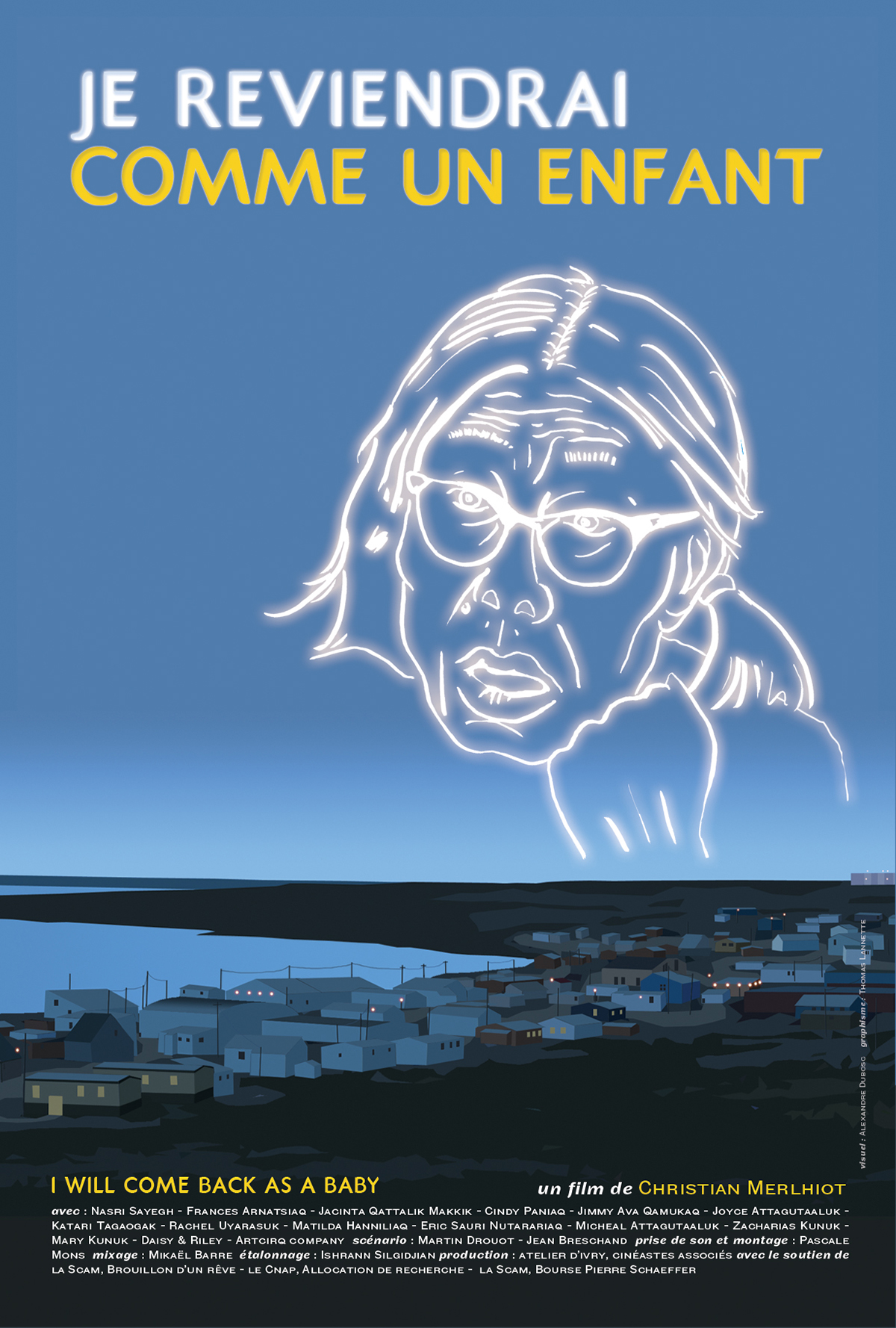Je reviendrai comme un enfant
I Will Come Back As A Baby
Film
2013, 92 minutes, vidéo, version originale anglaise et inuktitut sous-titrée français
Interprétation
Nasri Sayegh & Frances Arnatsiaq, Jacinta Qattalik Makkik, Cindy Paniaq, Jimmy Ava Qamukaq, Joyce Attagutaaluk, Katari Tagaogak, Daisy, Riley, Artcirq Company
Son & Montage
Pascale Mons
Mixage
Mikaël Barre
Production
Atelier d’Ivry, cinéastes associés, avec la participation de la Scam, Brouillon d’un rêve et Bourse Pierre Schaeffer et du Cnap, Allocation de recherche
Synopsis
Une petite communauté Inuit de l’Arctique canadien. Nasri est venu rencontrer les habitants d’Igloolik, descendants d’une société de chasseurs aujourd’hui sédentaire. Dans ce village, il découvre que l’esprit des morts est indissociable du monde des vivants et comprend l’importance des noms hérités des ancêtres et transmis de génération en génération.
A small Inuit community in the Canadian Arctic. Nasri has come to meet the inhabitants of Igloolik who belong to a hunting society which is now sedentary. In this remote village, he discovers that the spirits of the deceased are part of the world of the living and comes to understand the importance of names, which pass on the identity of ancestors to the newborns of the community.
Née vers 1905 dans l’Arctique oriental canadien, Iqallijuq est une femme Inuit qui a vécu le passage de la société traditionnelle nomade à la société sédentaire. En 1973, dans le village d’Igloolik où sa famille s’était installée, elle a raconté à l’anthropologue Bernard Saladin d’Anglure ses souvenirs relatifs à sa conception et sa naissance. Dans ce récit, elle souligne qu’elle était un garçon dans le ventre de sa mère et décrit comment elle est devenue fille au moment de la naissance pour satisfaire la volonté de l’ancêtre dont elle allait porter le nom. Recevoir le nom d’un ancêtre, en effet, c’est aussi recevoir un ensemble de qualités et de prédispositions, au-delà de la distinction des sexes et des genres.
Quand nous sommes partis à Igloolik à la fin de l’été 2009, nous n’étions pas certains que les habitants de cette communauté de 1700 habitants se souviendraient du récit d’Iqallijuq. Nous voulions questionner l’écho de son récit dans ce village où vivent plusieurs de ses descendants.
Au fil des semaines, le tournage a sans cesse déjoué nos attentes.
Jacinta et Joyce, deux petites-filles d’Iqallijuq, Katarina, Cindy ou Jimmy racontent l’héritage qu’ils ont reçu de leurs ancêtres et comment ils le transmettent à leur tour.
Une chose est certaine, dans chacune de ces rencontres, la frontière entre passé et présent, ancêtre et nouveau-né, homme et femme, naturel et surnaturel échappe aux repères de la culture occidentale. La parole rend visible la place des ancêtres dans la vie quotidienne – une vie parfois douloureuse, menacée par l’alcoolisme, la violence conjugale et la tentation du suicide.
À travers ces récits, c’est aussi en creux l’image d’une société et d’une culture en profonde mutation qui nous est donnée.
Born around 1905 in the Canadian Eastern Arctic, Iqallijuq was an Inuit woman who experienced the transition from a traditional nomadic society to a sedentary one. In 1973, in the village of Igloolik where her family had settled, she narrated her memories of her conception and birth to the anthropologist Bernard Saladin d’Anglure. In her account, she stressed that she was a boy in her mother’s womb, and described how she became a girl at the moment of birth to satisfy the will of the ancestor whose name she was to bear. To receive an ancestor’s name, in fact, is also to receive a set of qualities and predispositions, beyond the distinction of sexes and genders.
When we set out for Igloolik in late summer 2009, we were not sure whether the inhabitants of this community of 1,700 would remember Iqallijuq’s story. We wanted to question the echo of her story in this village, where several of her descendants live.
Over the weeks, the filming constantly defied our expectations.
Jacinta and Joyce, two granddaughters of Iqallijuq, Katarina, Cindy and Jimmy talk about the heritage they received from their ancestors and how they pass it on in turn.
One thing is certain: in each of these encounters, the boundaries between past and present, ancestor and newborn, man and woman, natural and supernatural escape the points of reference of Western culture. The spoken word makes visible the role of ancestors in daily life – a sometimes painful life, threatened by alcoholism, domestic violence and the temptation of suicide.
Through these stories, implicitly, we also witness the image of a society and a culture undergoing profound change.












